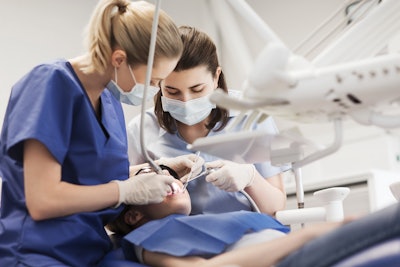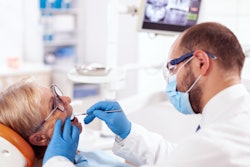
Incorporating a diode laser and erythritol air polishing as supplements to scaling and root planing (SRP) may offer an accelerated periodontal treatment method, according to a study recently published in BMC Oral Health.
Furthermore, this treatment effectively reduces bacterial presence and improves periodontal health, the authors wrote.
"The supplementary use of diode laser and erythritol air polishing, alongside SRP, represents an expedited periodontal treatment modality," wrote the authors, led by Sara M.A. Elmeligy of Mansoura University in Egypt (BMC Oral Health, July 4, 2024, Vol. 24, 763).
The study included 24 patients age 30 and older who had been diagnosed with stage I and II periodontitis. Group one, the control group, included eight patients who received treatment consisting solely of SRP. Group two included eight patients who underwent SRP followed by the application of erythritol air polishing. Group three included eight patients who underwent SRP followed by the application of a diode laser treatment.
Clinical periodontal parameters, including the plaque index (PI), gingival index (GI), periodontal probing depth (PPD), and clinical attachment level (CAL) were measured at baseline and six weeks. The bacterial count of Aggregatibacter actinomycetemcomitans and Porphyromonas gingivalis was evaluated at different points in time.
Following treatment, PIs significantly decreased in all groups (p <0.001), with no significant difference in post-treatment PIs between the three groups (p >0.05). Post-treatment, GIs significantly decreased in all groups (p <0.001). All groups showed a significant reduction in PPD after treatment (p <0.001).
Furthermore, no significant changes in PPD were observed between the erythritol and control groups (p >0.05). Postintervention, CALs significantly decreased in every group (p <0.05). The laser group's CAL was notably lower than that of the erythritol group (p = 0.004) and the control group (p = 0.028), while no significant change in CAL was observed between the erythritol and control groups (p >0.05), according to the results.
The laser group showed a significant decrease in A. actinomycetemcomitans count (p = 0.001), while the erythritol group showed a significant increase (p = 0.014). Significant differences were observed between the laser and erythritol groups and between the erythritol and control groups (p <0.05) but not between the laser and control groups.
Post-treatment, P. gingivalis levels decreased in all groups. Notable variations were observed in the laser group between pretreatment and the first post-treatment period (p = 0.028) and in the erythritol group (p = 0.001), according to the results.
However, the study had limitations, including the small sample size. Future research should involve larger and more diverse populations to enhance the applicability of the results, the authors added.
"The application of diode laser and erythritol air polishing have a beneficial effect in the treatment of periodontitis compared to SRP alone," they concluded.




















